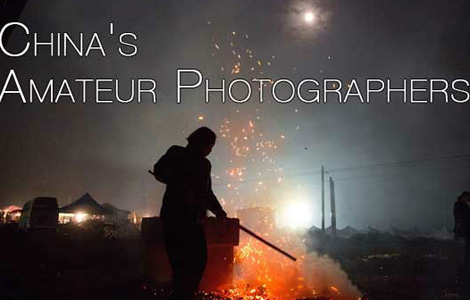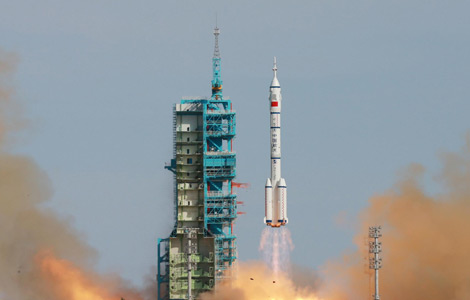Whistleblower pulls US into confidence crisis
Updated: 2013-06-14 15:17
(chinadaily.com.cn)
|
|||||||||||
|
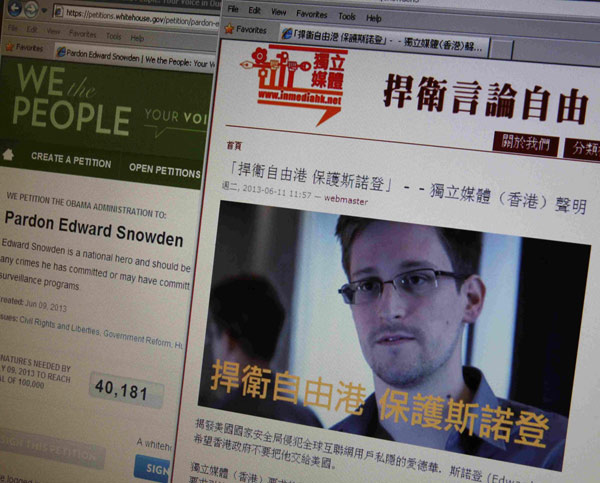 |
|
A statement by Hong Kong online media "In Media Hong Kong" supporting Edward Snowden, a contractor at the National Security Agency (NSA), is displayed alongside a petition to "Pardon Edward Snowden" on a White House website, on a computer screen in Hong Kong in this June 12, 2013 illustration photo. [Photo/Agencies] |
US whistleblower Edward Snowden has disclosed that the US government had been hacking into computers in Hong Kong and on the Chinese mainland since 2009, sparking extensive discussions about the US cyber policy and its long-held accusation against China.
The 29-year-old defense contractor revealed two classified National Security Agency (NSA) surveillance programs, one collecting US phone records and the other mining Internet data.
According to the Guardian and the Washington Post, the NSA and the FBI had been secretly tapping directly into the central servers of nine US Internet companies, extracting audio, video, photographs, e-mails, documents and connection logs that enable analysts to track a person's movements and contacts over time.
Snowden believed there had been more than 61,000 NSA hacking operations globally, with hundreds of targets in Hong Kong and on the mainland. Among the targets were the Chinese University of Hong Kong and public officials, businesses and students in the city, and the NSA also hacked mainland targets, according to the South China Morning Post.
"We hack network backbones - like huge Internet routers, basically - that give us access to the communications of hundreds of thousands of computers without having to hack every single one," Snowden said.
In recent years, the United States has accused China of hacking suspected US secrets, with China repeatedly saying that China is a victim of the worst cyber attacks. As Snowden said, the disclosure exposed "the hypocrisy of the US government when it claims that it does not target civilian infrastructure."
|
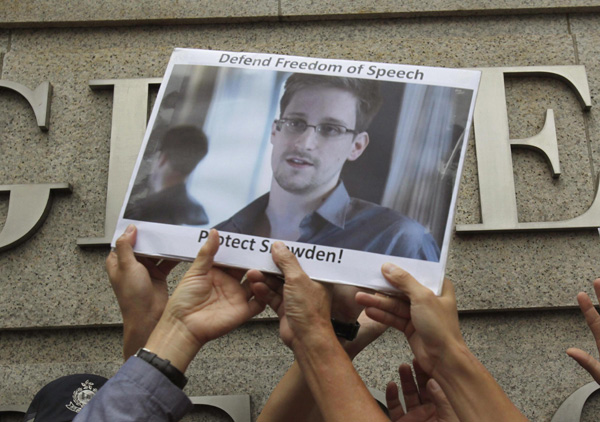 |
|
Protesters supporting Edward Snowden, a contractor at the National Security Agency (NSA), hold a photo of Snowden during a demonstration outside the U.S. Consulate in Hong Kong June 13, 2013. China's Foreign Ministry offered no details on Thursday on Snowden, the National Security Agency contractor who revealed the U.S. government's top-secret monitoring of phone and Internet data and who is in hiding in Hong Kong. [Photo/Agencies] |
The scale and scope of surveillance over civilian infrastructure, particularly targets in China, took many by surprise.
"For months, Washington has been accusing China of cyber espionage, but it turns out that the biggest threat to the pursuit of individual freedom and privacy in the US is the unbridled power of the government," Li Haidong, from China Foreign Affairs University, said Thursday.
A user named "orsonzg" wrote on China Daily's website that the US surveillance against China should be considered from the fact that "The US moved 60% of their navy to the Asia Pacific solely to contain China, this hostile act of aggression seems like a prelude to war in my opinion."
The incident "seriously discredits" the US over previous claims about human rights, privacy and due process, and "is potentially a massive confidence crisis," Lee Kai-Fu, former head of Google Inc's China division, said in a phone interview with Bloomberg.
Internationally, the European Union's chief justice official has written to the US attorney general demanding an explanation for the collection of foreign nationals' data through its spy program. News media also reported that Russia may grant political asylum to the former technical assistant at the Central Intelligence Agency.
Related stories:
US NSA chief defends surveillance programs
US should 'explain hacking activity'
US hacking China for years: Report
Opinions:
Surveillance program a test of Sino-US ties
US surveillance program exposed
Related Stories
World owes Snowden debt of gratitude 2013-06-14 08:15
China firmly supports cyber security: Xi 2013-06-09 13:58
Cyber security, Korean issue top Xi-Obama agenda 2013-06-05 11:42
NATO defense ministers focus on cyber security 2013-06-04 19:15
China willing to talk with US on cyber security 2013-06-04 02:21
US, China face cyber security threats: Hagel 2013-06-01 16:13
Today's Top News
China gives approval to GM soybeans
EU files WTO dispute on steel measures
EU seeks WTO ruling over steel measures
Nation's rise a common goal across Straits
Astronauts into space module
Li urges further Ethiopian ties
US should 'explain hacking activity'
Chinese continue leaving Ghana
Hot Topics
Lunar probe , China growth forecasts, Emission rules get tougher, China seen through 'colored lens', International board,
Editor's Picks

|

|

|

|

|
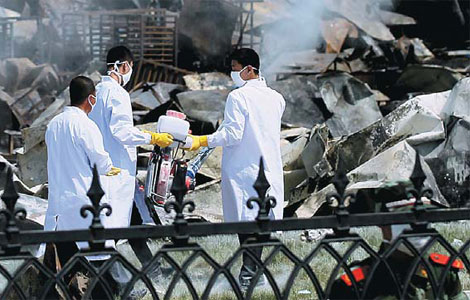
|
